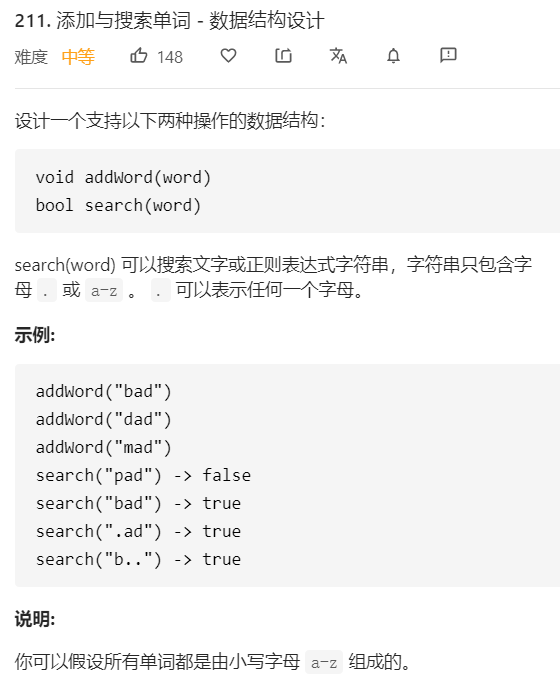
这题和LeetCode208. 实现 Trie (前缀树)一样,都是实现Trie树,
支持字符串的插入和查找,只不过这里的查找需要支持正则表达式,也就是可以用'.'代替任何单词,所以我们需要在查找部分做一些修改,
插入单词部分和208题一样。
对于查找单词,由于需要支持正则表达式,所以在查找单词word的某个位置如果是'.'时,需要对于当前树的所有子树进行搜索,因此我们
需要额外写一个dfs函数对字符串进行查找。
这里就在代码部分重点讲一下dfs函数,其他部分和208题一致,可以看我上面那个链接,这里就不细讲了。
代码如下:
class WordDictionary {
public:
struct Node {
Node* son[26];
bool is_end;
Node() {
for(int i = 0; i < 26; ++i) {
son[i] = NULL;
}
is_end = false;
}
}*root;
/** Initialize your data structure here. */
WordDictionary() {
root = new Node();
}
/** Adds a word into the data structure. */
void addWord(string word) {
Node* p = root;
for(int i = 0; i < word.size(); ++i) {
int u = word[i] - 'a';
if(p -> son[u] == NULL) {
p -> son[u] = new Node();
}
p = p -> son[u];
}
p -> is_end = true;
}
/** Returns if the word is in the data structure. A word could contain the dot character '.' to represent any one letter. */
bool search(string word) {
return dfs(root, word, 0); //从根节点(空)开始,搜索单词word,第三个参数表示当前已匹配前多少个字母
}
bool dfs(Node* p, string &word, int i) {
if(i == word.size()) { //如果所有单词都匹配,即在trie树中存在路径和word相等,则需要判断结尾的is_end标记是否为true
return p -> is_end;
}
if(word[i] != '.') { //如果当前字母不是通配符'.',则不需要枚举所有可能的路径
int u = word[i] - 'a';
if(p -> son[u] == NULL) { //只需要看当前字母是否有word[i]这个儿子就好
return false;
}
p = p -> son[u]; //如果有这个儿子,继续往下递归搜索,匹配word的剩余部分
return dfs(p, word, i + 1);
} else {
for(int j = 0; j < 26; ++j) { //如果当前字母是通配符'.',则需要递归搜索所有的儿子进行匹配
if(p -> son[j] != NULL && dfs(p -> son[j], word, i + 1) == true) { //如果沿着某个子树匹配成功,则返回true
return true;
}
}
return false; //所有路径都无法匹配,返回false
}
}
};
/**
* Your WordDictionary object will be instantiated and called as such:
* WordDictionary* obj = new WordDictionary();
* obj->addWord(word);
* bool param_2 = obj->search(word);
*/